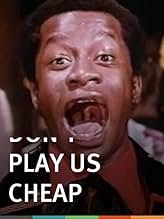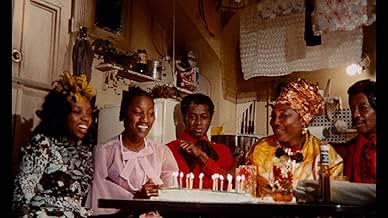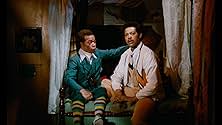Ajouter une intrigue dans votre langueAs an African American family and friends gather in an apartment for a house party, two imps take human form in order to break up the party.As an African American family and friends gather in an apartment for a house party, two imps take human form in order to break up the party.As an African American family and friends gather in an apartment for a house party, two imps take human form in order to break up the party.
- Réalisation
- Scénario
- Casting principal
Jay Van Leer
- Mrs. Johnson
- (as Jay Vanleer)
Joe Keyes Jr.
- Trinity
- (as Joseph Keyes)
Avis à la une
Some people will complain about the acting, as if it had hollywood budget for retakes and such, but that would be an idiotic thing to assume or even want in a play about two little devils wanting to crash and end a Saturday night party. The singing is top notch, the wtf moments are wonderful, and some of the shotty filming is most likely due to post production. I had fun watching it, and it does have replay value. Ester Rolle acting was good as you would expect, Jay Van Leer's voice will leave you in awe, Mabel king embracing her body shape, and George McCurn's Quitting time left me with chills. So impressed, I have spent the last 20-30 minutes deep diving online to find out more about this guy. I don't know how to explain it, but he makes me feel like he's someone we all know. I'm a grown man who hasn't cried more than twice in 25 years hold back tears(unsuccessfully) even though the song Quitting Time doesn't feel like a sad song. I rate it 10 because I felt like a 10 after watching it.
My review was written in June 1990 after watching the movie at MoMA's screening room.
Melvin Van Peebles' film of his play "Don't Play Us Cheap" is an entertaining artifact made 18 year ago. Put on the shelf after having only benefit screenings in 1972/73, pic offers some terrific musical numbers and an ebullient look at black culture of a generation back.
Utilizing the same cast that he directed on Broadway, Van Peelbes creates the atmosphere of a house party in Harlem that's a direct forerunner of the Hudlin Brothers recent hit "House Party".
His fantasy premise of an imp and little devil creating the party to spoil it out of pure meanness allows the filmmaker's militant themes to be expressed in humor and whimsy.
Among the dozen tunes composed by Van Peebles is a show-stopping number "Quittin' Time" sung by lanky George (Ooppee) McCurn. It's a sterling example of the power of recording musical numbers in direct sound, a technique revived for the occasion (two years before Peter Bogdanovich' similarly inclined "At Long Last Love") by Van Peebles, who went to the trouble of building sets in New Mexico and using mobile sound trucks for that purpose.
There's also an extremely complex roundelay of four songs sung together which comes off impressively. Hurting the film's overall impact is van Peebles' use of visual tricks left over from the '60s, particularly superimpositions, that stunt the live performance feel. In particular, coloratura Rhetta Hughes' big number is ruined by the disconcerting multiple images of her overlaid on screen.
Fantasy elements climax with black comedy of topliner Esther Rolle smashing the little devil in the form of a cockroach with a rolled up newspaper. Rolle is in great form as the party hostess, ably supported by an ensemble cast.
Tech credits range from topnotch sound recording to shaky camerawork.. Most setups are filmed using the multiple camera method and both focus and framing are too loose at times. Editing, credited to the filmmaker, is haphazard where a seamless approach would have benefited the "live" feel.
Pic deserves a second round of look-sees by potential distributors, as it sharfes he sme time capsule qualities that finally earned "The Plot Against Harry" a latter-day release.
Melvin Van Peebles' film of his play "Don't Play Us Cheap" is an entertaining artifact made 18 year ago. Put on the shelf after having only benefit screenings in 1972/73, pic offers some terrific musical numbers and an ebullient look at black culture of a generation back.
Utilizing the same cast that he directed on Broadway, Van Peelbes creates the atmosphere of a house party in Harlem that's a direct forerunner of the Hudlin Brothers recent hit "House Party".
His fantasy premise of an imp and little devil creating the party to spoil it out of pure meanness allows the filmmaker's militant themes to be expressed in humor and whimsy.
Among the dozen tunes composed by Van Peebles is a show-stopping number "Quittin' Time" sung by lanky George (Ooppee) McCurn. It's a sterling example of the power of recording musical numbers in direct sound, a technique revived for the occasion (two years before Peter Bogdanovich' similarly inclined "At Long Last Love") by Van Peebles, who went to the trouble of building sets in New Mexico and using mobile sound trucks for that purpose.
There's also an extremely complex roundelay of four songs sung together which comes off impressively. Hurting the film's overall impact is van Peebles' use of visual tricks left over from the '60s, particularly superimpositions, that stunt the live performance feel. In particular, coloratura Rhetta Hughes' big number is ruined by the disconcerting multiple images of her overlaid on screen.
Fantasy elements climax with black comedy of topliner Esther Rolle smashing the little devil in the form of a cockroach with a rolled up newspaper. Rolle is in great form as the party hostess, ably supported by an ensemble cast.
Tech credits range from topnotch sound recording to shaky camerawork.. Most setups are filmed using the multiple camera method and both focus and framing are too loose at times. Editing, credited to the filmmaker, is haphazard where a seamless approach would have benefited the "live" feel.
Pic deserves a second round of look-sees by potential distributors, as it sharfes he sme time capsule qualities that finally earned "The Plot Against Harry" a latter-day release.
This was a cool musical movie! It was nice to see Esther Rolle and Teresa Merrit in another role besides the roles that made them very popular. This movie was so funny and crazy. It was definitely a great movie to be made in 1973!
Wow what an odd film. This is one of those films that only a mother could love. And then 30 years later a whole new audience sees it. What may have looked too strange then can now be seen with new eyes. This movie is thick. The colors and aesthetic,the textures and flow are so different from other movies that if you watch it like you would another movie you might miss it. Watch this movie without any of your existing experience filters and let it present itself to you and then you might see the genius of it. That's all I have to say.
6tavm
After months of this being listed as "long wait" on Netflix, I finally got the disc of this movie from them just today. It was the fact this was Melvin Van Peebles' follow-up to his hit Sweet Sweetback's Baadasssss Song that got me wanting to watch this as well as the fact it was originally a stage musical he wrote. What a thrill to see future TV stars like Esther "Good Times" Rolle and Mabel "What's Happening?!" King here though my favorite of the singing cast was Joshie Armstead when she warbled "You Cut Up the Clothes in the Closet of My Dreams". All those songs and some of the loud dialogue can be exhausting but this was never boring, let me tell you! I was also thrilled to find out the musical director was Harold Wheeler who I know as the conductor of the band and singers on "Dancing with the Stars", at least he was until last season. So on that note, I recommend Don't Play Us Cheap.
Le saviez-vous
- AnecdotesFilm features two of the most popular black actresses from 70's black sitcom history. Ester Rolle from Good Times and Mabel King from What's Happening.
Meilleurs choix
Connectez-vous pour évaluer et suivre la liste de favoris afin de recevoir des recommandations personnalisées
- How long is Don't Play Us Cheap?Alimenté par Alexa
Détails
Contribuer à cette page
Suggérer une modification ou ajouter du contenu manquant

Lacune principale
By what name was Don't Play Us Cheap (1972) officially released in Canada in English?
Répondre






















